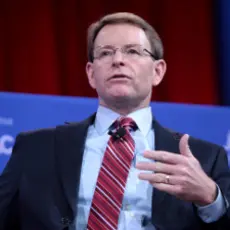The Family Research Council’s attempts to paint President Obama’s female nominees to the D.C. Circuit Court of Appeals as “radical feminists” aren’t going so well.
First, the FRC attacked Nina Pillard for quoting something the late Chief Justice Rehnquist wrote about the importance of the Family and Medical Leave Act.
Now, the FRC seems to think it’s found a winning argument against Patricia Millett, the other woman in the slate of three D.C. Circuit nominees: She thinks there should be women on the Supreme Court.
In his daily email on Friday, FRC’s Tony Perkins wrote:
As it stands right now, the D.C. Circuit is evenly divided between Democrat and Republican appointed judges -- but that's about to change. Using the nuclear option, the Senate moved forward with reconsidering Patricia Millett, the first of three previously blocked nominees the President will be employing to pack the court in his favor. Millett has shown an activist tendency in how she views the court, believing it's more important it look a certain way than judge a certain way.
When President Bush nominated Samuel Alito to replace Justice Sandra Day O'Connor, Millett bemoaned that O'Connor wasn't being replaced by another woman, as if gender impacts who's most qualified to apply the Constitution to the facts in a case or that our highest court should be seen as a representative body. She sees the redefinition of marriage turning on her own definition of fairness and not the law.
FRC seems to have picked up this line of attack from a talking points document put together by the right-wing Judicial Action Group, which claims that Millett's comment in a 2009 interview that “there was a lot of upset over the failure to put a woman on to replace Justice Sandra Day O’Connor” shows that she would have a poor "judicial temperament.”
Yes, this is actually the argument that FRC is using against an accomplished woman’s judicial nomination in 2013.
Here’s what Millett actually said, in a 2009 interview about whom President Obama might choose to replace Justice David Souter on the Supreme Court. At the time, there was just one woman on the court and Millett stressed that there were “many qualified women” who would make President Obama’s short-list, even if gender was not considered:
There was a lot of upset over the failure to put a woman on to replace Justice Sandra Day O’Connor and…it would be extraordinary to have no women on the Supreme Court in this day and age. But even to only have one is, I think, a sorry statement about the appointment process thus far, and where it’s gotten in the last eight years.
So, I think the pressure to have a Supreme Court that looks in many ways – and gender is just one way – that is reflective of the public it serves, would require that a woman gets serious consideration. And there’s no doubt that there are many, many qualified women who – entirely apart from their gender, if nobody even considers about their gender –would be short-listed for the Supreme Court in any event, so it makes that easy.
By the way, in case you were wondering about FRC’s claim that Millett “sees the redefinition of marriage turning on her own definition of fairness and not the law,” that also comes from JAG's talking points. JAG points to an interview Millett gave previewing the Supreme Court’s hearing of the DOMA case, in which she referred to the question before the Court – whether DOMA’s unequal treatment of same-sex and opposite-sex marriage’s violated the Fifth Amendment’s due process clause – as the “fundamental fairness question before the Court.” That is, she was accurately describing the issue the Court was asked to consider; she never implies that the issue is “turning on her own definition of fairness and not the law.”






